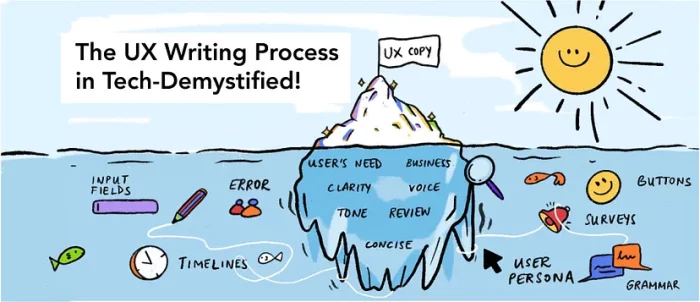In today’s digital age, content writing is essential for companies to connect with their target audiences and drive engagement.
However, not all content is created equal. By understanding the different types of content writing, you can unlock their unique potential and create content that resonates with your target audience.
This article will explore 11 types that can help you maximize engagement, including social media marketing, long-form writing, case studies, and UX writing.
Also, you can better understand how to harness the power of words and create content that drives traffic and builds your brand.

Source: reviewsreporter.com
Types of Content Writing
Content writing is a widespread term encompassing various writing styles, tones, and purposes. Whether you’re crafting a witty social media post or a detailed technical document, there are many different types of content writing to consider.
- Blog writing
- SEO writing
- Website copywriting
- Ghostwriting
- Press release writing
- Email marketing
- Technical writing
- Social media marketing
- Long-form writing
- UX writing
- Case studies
Blog writing
Blog writing specifically caters to blogs and involves writing in a conversational and informative tone that covers various topics. Businesses often use blog writing to drive website traffic, establish expertise in a particular industry or niche, and engage with their audience.
A successful blog post is well-researched, well-written, and optimized for search engines so that it can attract and retain readers.
Blog writers often use a mix of storytelling, data, and visuals to keep their audience engaged and informed. Depending on the topic and the audience, blog writing can range from short and snappy to in-depth and detailed.
Overall, blog writing is a versatile and practical form of content writing that can help businesses achieve their marketing and branding goals.
For those who are unsure of their writing skills, we offer our SEO content writing services as a solution.
SEO writing
SEO (Search Engine Optimization) writing aims to improve a website’s search engine rankings. It involves using specific keywords and phrases relevant to the website’s content, making it easier for search engines to understand what the website is about.
SEO writing typically involves incorporating keywords and phrases in the content in a natural and informative way for readers while adhering to specific rules and guidelines to ensure optimal search engine performance.
The goal is simple–create high-quality, relevant content that attracts and retains readers while improving the website’s ranking and visibility in search engine results in pages.
Effective SEO writing can help businesses reach their target audience, increase their online presence, and drive more traffic and conversions to their website.
Website copywriting
Website copywriting focuses on the text content of a website. It includes all the written material on a website, including headlines, product descriptions, ‘About Us’ pages, and more.
The primary goal of website copywriting is to create straightforward, concise, and compelling content that engages and informs website visitors and motivates them to take action, such as purchasing or filling out a contact form.
Effective website copywriting requires a thorough understanding of the website’s target audience and a clear understanding of the website’s purpose, goals, and brand identity. Website copywriters must be skilled in using techniques such as scannable text, clear headlines, and clear calls to action.
Ghostwriting
Ghostwriting involves a writer creating content on behalf of another person who later gets credited as the author of the content. This means that the ghostwriter’s name does not appear on the content, and they are often obligated to sign a non-disclosure agreement to ensure confidentiality.
Ghostwriting is a common practice where a writer gets hired to create a book, article, or other content for someone else. Companies also use ghostwriting for corporate communications, including speeches, press releases, and marketing materials.
The goal of ghostwriting is to create high-quality content that accurately reflects the voice and perspective of the credited author. Ghostwriters must have strong writing skills and the ability to research and work closely with their clients to understand their vision and goals.
While ghostwriting can be a lucrative career for writers, it can also be controversial, raising questions about authorship and transparency.

Source: grammarly.com
Press release writing
Press release writing focuses on creating newsworthy content to share with media outlets and other interested parties. A press release typically announces a new product or service, an event, or other newsworthy developments in a company or organization.
Press release writing aims to attract media attention and generate interest and coverage of the company or organization’s news or events.
Press release writers must have a strong understanding of the news cycle and the ability to write in a clear and concise style that effectively conveys the message of the release.
The content must be newsworthy, timely, and adhere to specific standards and guidelines that journalists and media outlets commonly use. A well-written press release can help a company or organization build its reputation, establish its brand, and generate new business opportunities.
Email marketing
Email marketing aims to generate interest in a product, service, or brand and drive conversions, such as purchases or sign-ups.
Email marketing campaigns include newsletters, promotional offers, event invitations, and product updates. Effective email marketing requires a deep understanding of the target audience and the ability to craft compelling and persuasive messages that resonate with them.
The content of an email marketing message must be engaging, informative, and well-structured, with clear calls to action that encourage recipients to take the desired action.
Most email marketing writers are also skilled in using data and analytics to measure the success of their campaigns and make informed decisions about future messaging and strategies.
Technical writing
Technical writing requires understanding complex topics and translating them into clear, concise language that non-technical readers can easily understand. Various fields, including engineering, science, software development, and medical research, utilize this type of writing.
Technical writers often collaborate with subject matter experts to ensure the information’s accuracy and completeness. They may also use graphics, charts, and other visual aids to enhance the reader’s understanding.
To be a successful technical writer, one must have excellent writing and editing skills, strong attention to detail, the ability to work independently and as part of a team, and a solid understanding of the subject matter they are writing about.
They must also be proficient in using technical tools such as software documentation, online help systems, and API documentation.
To distinguish between a technical writer and a technical content writer, you can read our article and discover the dissimilarities.
Social media marketing
Social media marketing means creating content designed to engage and interact with a target audience, aiming to drive website traffic, increase brand awareness, and generate sales.
Social media marketing is a crucial component of any modern digital marketing strategy. Content writers often create this type of content by tailoring social media posts, blog articles, videos, and infographics to suit the specific platform.
To succeed in social media marketing, content writers must deeply understand their target audience and the platforms on which they are active. That said, while doing that, you can organically increase social engagement.
They must also be skilled at creating compelling content while staying on brand and maintaining a consistent tone and voice across all social media channels.

Source: wpsocialninja.com
Long-form writing
Long-form writing is creating articles typically over 1,000 words. These pieces are designed to provide readers with in-depth information on a particular topic and often require extensive research and analysis.
Long-form writing can take many forms, including blog posts, feature articles, case studies, and white papers. The main goal is to engage readers with high-quality content that is educational, informative, and entertaining.
To succeed in long-form writing, content writers must be able to conduct thorough research and organize and present complex information in an engaging and accessible way.
UX writing
UX writing, also known as user experience writing. The writer focuses on creating clear and concise text within digital products such as apps, websites, and software.
The main goal of UX writing is to enhance the user experience by providing guidance, clarity, and direction to the user. UX writers collaborate with designers, developers, and product managers to create content consistent with the brand’s voice and tone that meets the user’s needs.
This type of content writing involves crafting microcopies such as error messages, button labels, tooltips, and longer-form content such as product descriptions and user guides.
The key to successful UX writing is keeping the content concise and relevant while focusing on the user’s needs and goals.

Sources: design.zeta.in
Case studies
Case studies demonstrate the value and effectiveness of a particular solution, product, or service by showcasing how it has solved a real-world problem for a customer or client.
They typically follow a specific format, including an introduction to the problem or challenge faced by the customer, a description of the solution provided, and a discussion of the results achieved. Case studies may also include testimonials, data, and other supporting evidence to further reinforce the solution’s effectiveness.
Case studies are often used in B2B marketing, allowing businesses to showcase their expertise, problem-solving capabilities, and value proposition to potential clients.
For content writers to create a successful case study, they must possess the skills to thoroughly research the topic, analyze relevant data, and present the information clearly and engagingly.
Conclusion
Content writing is a versatile and powerful tool for engaging and connecting with audiences across various platforms. The types we explored today offer a range of options for businesses and individuals to effectively communicate their message to their target audience.
Each type of content writing has its unique purpose and benefits, from blogs to articles to product descriptions and social media content.
By understanding the different types of content writing and using them effectively, you can unlock the power of words to drive engagement, increase visibility, and ultimately achieve your communication goals.
